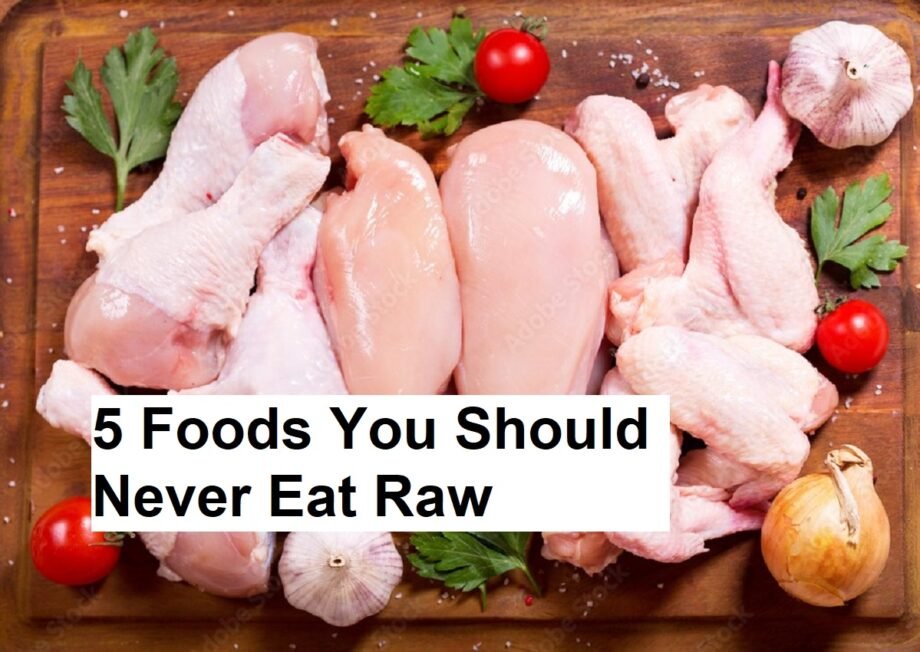Introduction
Eating raw food can sometimes be tempting, but certain foods carry significant health risks if consumed without proper cooking. Some common foods, including poultry, eggs, potatoes, red beans, and sprouts, should always be cooked thoroughly to avoid potential foodborne illnesses and toxicity. This article highlights the dangers of eating these foods raw and explains why cooking is essential for your safety and well-being.
Poultry: Risk of Bacterial Contamination
Raw poultry, such as chicken or turkey, is notorious for harboring harmful bacteria like Salmonella and Campylobacter. These bacteria can cause severe food poisoning symptoms, including diarrhea, vomiting, fever, and abdominal pain. Consuming undercooked or raw poultry increases the risk of infection dramatically. Cooking poultry to the right internal temperature—at least 165°F (74°C)—kills harmful pathogens, making it safe to eat.
Eggs: Chance of Salmonella
Raw or undercooked eggs may contain Salmonella bacteria, which can lead to food poisoning known as salmonellosis. Symptoms typically include stomach cramps, diarrhea, and fever. Eggs used in recipes like homemade mayonnaise, mousse, or raw cookie dough pose this risk if they’re not pasteurized or thoroughly cooked. It’s recommended always to cook eggs until both the yolk and white are firm, or to use pasteurized egg products when raw eggs are necessary.
Potatoes: Toxic Compounds in Raw Form
Raw potatoes contain high levels of solanine and chaconine, naturally occurring toxins that can cause nausea, headache, and neurological symptoms even in small amounts. Solanine is concentrated especially in green or sprouted potatoes. Cooking potatoes breaks down these toxic compounds, rendering them safe to eat. Eating raw or green potatoes should be strictly avoided to prevent poisoning.
Red Beans (Kidney Beans): High in Phytohaemagglutinin
Raw or undercooked red kidney beans contain phytohaemagglutinin, a toxic protein that can cause severe nausea, vomiting, and diarrhea within hours of consumption. The toxin is destroyed only by boiling beans at high temperatures for at least 10 minutes. Simply soaking or slow cooking without boiling may not remove the toxin effectively. Proper preparation is crucial for safely enjoying kidney beans.
Sprouts: Easy Breeding Ground for Bacteria
Raw sprouts, such as alfalfa, mung bean, or radish sprouts, can be contaminated with dangerous bacteria like E. coli and Salmonella. Because sprouts grow in warm and humid conditions, they provide an ideal environment for bacterial growth. While sprouts add texture and flavor, consuming them raw has been linked to foodborne illness outbreaks. Cooking or avoiding raw sprouts is the safest choice, especially for vulnerable groups like children, elderly, and pregnant women.
Why Cooking Matters: Safety and Health Benefits
Cooking food not only enhances flavors and textures but also plays a vital role in food safety. Proper heat treatment kills harmful microorganisms and reduces toxin levels, preventing foodborne illnesses. Following recommended cooking guidelines protects you and your family from potential health hazards linked to raw consumption of certain foods.
Final Thoughts
Avoiding these five foods in their raw state is critical for maintaining your health and preventing food poisoning. Always cook poultry, eggs, potatoes, red kidney beans, and sprouts thoroughly before consumption. By following safe cooking practices, you can enjoy these nutritious foods without the unnecessary risks.









